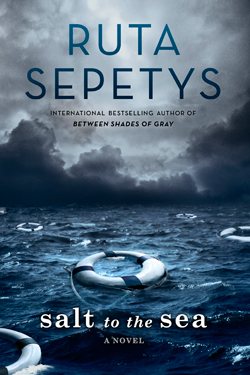Salt in the wound: a “Salt to the Sea” review
Ruta Sepetys’ Carnegie Medal-winning historical fiction novel about the worst maritime disaster of all time disappoints.

I was really looking forward to reading Ruta Sepetys‘ “Salt to the Sea”. My brother read her debut as an eighth grader and really liked it. There were all the glowing reviews from critics. Then there were the videos with well-known BookTubers as the release date loomed last year. Lastly, this year, the novel received the Carnegie Medal, a British literary award that recognizes a fantastic book published for children or young adult readers.
Needless to say, I was excited. If Sepetys was as highly regarded as she was, surely this meant that her work would be excellent. I picked up her latest book and started to read it.
Unfortunately, things didn’t turn out so great. I found myself so frustrated and angry as I turned the pages of this tale. For a moving and tragic journey, it never felt that way. From characters to setting and even to writing, all the elements to bring this together felt detached from the situation this portrayed: the Russian torpedoing of the Wilhelm Gustloff, a German military transport ship that would have given 10,000 refugees freedom instead of killing 9,400 of them.
This shouldn’t have been the case, especially since Sepetys’ research was so intricate and really laid a nice platform for everything to build upon. The architecture and overcrowding of the Wilhelm Gustloff to the stolen Amber Room that the Germans kept under lock and key; those were the things I liked. Alas, they faded into the background and left me to fend with the annoying protagonists of this book.
There are four narrators in “Salt to the Sea”: Alfred, a German naval officer working on the ship; Emilia, a 15-year-old girl who fled her home country from Poland; Florian, a Prussian boy who behaves like a soldier and seems cold and distant; and Joana, the oldest of the quartet, the motherly nurse figure and a Lithuanian refugee. Each character takes their turn with short chapters (from one to five pages, sometimes even a sentence or two), and it’s not enough to really get the chance to know them. I only got short blips of what they were like. Joana was my favorite, just because she seemed like the one Sepetys cared about the most. The rest were more of a mixed bag.

Florian was cold-hearted, selfish and determined to complete this mission he was undertaking in order to avenge both the death of his father and his treatment as a pawn by a mentor he admired. He changes as the story continues, but it’s mostly because he falls in love with Joana in that tired and true way all brooding YA males do. Does every YA book need a romance? This one certainly didn’t. There were people dying!
Emilia had the simplest language of the book and yet said very profound things that didn’t quite match up. She came across as very naive, which I guess was the point, but she wasn’t nearly as irritating as Alfred. He represented the worst side of Germans during World War II, the Nazis, but I would’ve liked something to redeem him, maybe self-awareness. Heck, if not that, then at least I wanted to feel or root for him. I never could. He was a terrible human being: sexist and too caught up in his own head to realize how greedy and selfish he was. He thought he was hot stuff in the mental letters to the girl he loved, but he was an absolute wuss who never paid attention to anything going on around him.
Surprisingly, the supporting cast of refugees was a lot more interesting than our leads. Usually you’d want your main characters to have some punch, but not in this book. I really liked the old man everyone called the Shoe Poet because he repaired shoes and told everyone that their stories could be found in them, the little boy named Klaus who kept death under wraps through saying people wouldn’t wake up, a giant woman named Eva who said a lot of crass things and apologized for them and Ingrid, the blind girl who everyone counted on as their guide since her other senses were sharp.

But nothing ever came to light to me. The writing felt limp and separate from the horrendous things that happened. First person combined with past tense was the culprit. I’m personally not used to writing and reading that style, but great writers can make it work. Sepetys struggled. All that happened was told to the reader instead of shown. Sometimes it became recursive, going back to previously stated points over and over. Because of this, I grew irritated. The story was simple and had little complexity. I couldn’t find myself caring much for the hardships the characters went through because their feelings and the world around them were kept at surface level. It made things even more awkward when some of the violence that popped up got incredibly graphic.
For those who like a fairly simple, fast-paced historical fiction novel captured from many different perspectives, “Salt to the Sea” should be on your radar. But those who want a little more weight should look elsewhere.
Your donation will support the student journalists of West High School. Your contribution will allow us to purchase Scholarship Yearbooks, newsroom equipment and cover our annual website hosting costs.

This is Luke's first and only year as a member of West Side Story. He'll be kept busy with anchoring, editing and reporting, but he's gonna have fun while...




Sree Pranav Somarouthu • Apr 11, 2019 at 12:14 pm
I personally think this is a great book